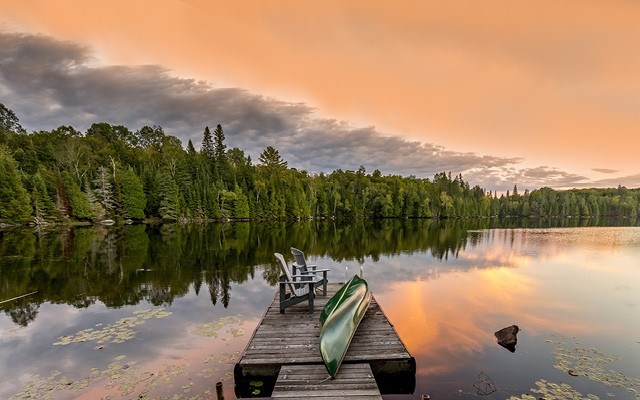Like most of Ontario, the land around my family cabin in the Haliburton Highlands once lay beneath an ocean of ice, a fact I'm fond of recalling on the very hottest of summer days.
Sitting on an old log by the shore, I think of those unimaginable times, when goliath boulders floated mile-high, locked in crystal waves that hung poised to break upon the land for some 50,000 years. When the frozen tide eventually ebbed, giant rivers poured the turquoised remains of exhausted snows down austere valleys lined by towering moraines. Pebbles tumbled through raging waters that ran opaque with rock flour ground from distant peaks. Then the great glaciers were gone, and darkened mirrors — the countless lakes of the Canadian Shield — filled the ancient channels, spreading across a naked land toward every horizon like puddles from some Pleistocene rain.
I think about the great forests that came later, verdant and vast beyond fantasy or imagination, a continental palisade interrupted only by les meres douces — the Great Lakes. I imagine the behemoths — white pine, maple, oak — standing silent as the first inhabitants roamed these shores, then bearing stoic witness to the coming of the white man before falling victim to his timber-hungry old-world markets. It was then that the great arbour — whose remains I perch upon — must have been felled, and woolen-clad, pancake-fed men, stale with another day's sweat, snapped their suspenders with pride as it crashed to the forest floor.
The log would have been skidded through the winter bush, pulled behind a draught team snorting indignant clouds in the frosty air as they jostled it through achingly bright snow, before being left, with the rest of the winter's labour, sitting on the lake ice. In spring the log would have finally floated free upon Kashagawigamog — the "long and flowing waters" of the local Ojibway. Driven by the J-hooks of bellowing shantymen to the tune of whisky-loosed ballads, the logs bobbed south toward the Gull River mills at Minden, Norland, Coboconk. Before the lake's narrows, where the water funnels over sand bars and long weeds flutter beneath the surface, the boom must have broken open. And the log, floating high, slid silently onto the sand in our cove.
For decades it lingered in the bay, rocking on grey foam waves, season upon season, sinking lower in the cool water, its cells heavy with time. Herons perched on the ragged, peeling bark, and turtles hauled out as it steamed under summer's sultry stare. I remember sitting on the log with an aunt as a child, dangling toes in clear water that sparkled over ripple marks in the sand, teasing minnows that darted toward us, tracking the bright-blue pincers of crayfish that poked out from beneath it. There were also clamshells, snails, frogs, spiders, beetles and my favourites — the dragonfly larvae that crawled out on the wood to ease slowly from their pupal casings. Leaving these crispy ghosts of aquatic existence behind they emerged, mosquito-eating helicopters that danced daily across the lawn. I'd turn these castings in my hand, marvelling at their symmetry, the secrets held in frozen-pose gossamer, then place them back, more or less where they'd been. They belonged to the log.
The vicissitudes of winter ice, high water, and frequent storms shifted the log every year. Up and down the waterfront it moved, turning always against the rock of a retaining wall built by local stonemasons for my great uncle Ernie, who'd erected this near-north retreat. No longer capable of floating, the log eventually owed any movement solely to shape, or bullying by winter ice. And I sat on it in all its myriad positions — with friends, cousins, sweethearts. It was a log with stories to tell. Every spring, on the first ride north from the city came the cry: "Where will the log be this year?" And it would never disappoint or betray, remaining in our cove, where we could love it in absentia with the unconscious familiarity reserved for favoured objects. But the log would never leave. Fifty years on it lays high on the beach, unmoved for decades; rotten, moss-covered, surrounded by grasses, bristling with alder shoots and bright blue forget-me-nots. Imbedded in the sand, it is nature's horizontal icon, stoic sentinel of the land's marvellous history that belies passage of many bare feet, canoes and myriad beer bottles. An ode to summers and generations past. A truly Canadian log.
The forest of its birth is centuries gone, but a present incarnation looms behind, crowding the cottage towards the lake — which, as lakes do, remains eager to swallow anything. So the log waits, where my daughter has known it, but known it not. She sees neither glacial ice nor unimaginable forest, hears no songs from moustached shantymen ghosts echoing sharp across October waters. Instead, there are only the forget-me-nots that dance upon the log, swaying to wind gusts that hum across the sand, occasionally drawing her gaze to the colour rippling in the grasses, as bright a blue as a crayfish claw.
Leslie Anthony is a Whistler-based author, editor, biologist and bon vivant who has never met a mountain he didn't like.




